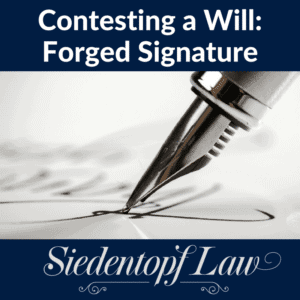Summary: In Georgia, anyone with an interest in someone’s estate can legally challenge a will that has been filed for probate. One of these categories of will challenges is a “forged signature,” meaning someone forged the testator’s signature on his or her will. If the challenge is successful, the courts may void the will.
When it comes to probating a will, most pass through the probate process without issue. But there are some situations in which a party might want to challenge the validity of the will. These will contests can be difficult, as many courts consider a Last Will & Testament to be the voice of the testator – and because that testator is no longer around, courts are hesitant to stray far from the contents of the will. In Georgia, anyone with an “interest” in someone’s estate can legally challenge a will that has been filed for probate. (Appellate courts regularly address what an “interested” person is; at the very least, the will in question must be adverse to the party’s interests). There are several different categories of will contests. This blog focuses on the possibility of a forged signature.
Under Georgia law, a will must be signed by the 1) testator and 2) two witnesses. If the testator cannot sign his or her name (because they cannot write or have some physical impairment) then he or she can make a mark on the will or direct someone to sign their name for them. Sometimes in this situation, an attorney may video the “signing.”
Prior to a will being submitted for probate, a person can file a “caveat” with the probate court to block the will. (A caveat is a document stating the reasons why someone objects to the validity of a will. The objection, for example, can be on the grounds that the will was procured by forgery). If a will has already been delivered to the probate court for filing, an individual can file a “petition” in the probate court. Depending on whether the executor requested common form probate or solemn form probate, the statute of limitations for a will contest is either four years (common form) or ten days (solemn form). As these are two drastically different amounts of time, it is important to determine the method of probate.
Once an individual files a caveat, the court will have a hearing on the will challenge. For claims of forgery, the evidence will likely include examples of the testator’s handwriting or signature, on or around the same time and circumstances that he or she created the Last Will & Testament. It is important to note that a person’s signature can change from one document to the next, depending on their age, any health issues, or even the amount of time they had to complete the signature. If the challenge is successful, courts void the forged will. If this happens, the court may reinstate a former version of the will (if there is one available), or the court may distribute the property based on Georgia’s intestacy laws. If the challenge is unsuccessful, the will stands as-is.
Some wills include a “no contest” clause, which is a clause designed to discourage any challenges by beneficiaries who are dissatisfied about their inheritance. If a beneficiary challenges a will containing a no contest clause, they do risk losing any inheritance provided to them in the will. However, these beneficiaries should not be dissuaded from filing a petition, as long as they are making any objections in good faith.
For more information about will contests, visit The Law Offices of Sarah Siedentopf, LLC’s website at EstateLawAtlanta.com or call (404) 736 – 6066.
© Sarah Siedentopf and Siedentopf Law, 2018. Unauthorized use and/or duplication of this material without express and written permission from this site’s author and/or owner is strictly prohibited. Excerpts and links may be used, provided that full and clear credit is given to Siedentopf Law and EstateLawAtlanta.com with appropriate and specific direction to the original content.








